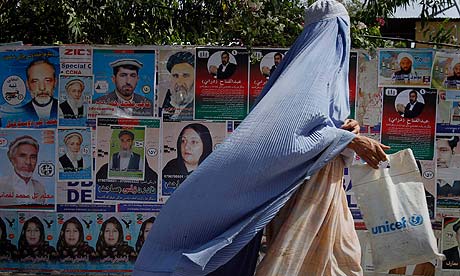Afghanistan election fraud fears force 900 polling stations to stay shut
![]()
Afghanistan election fraud fears force 900 polling stations to stay shut
Election commission says it has no option but to turn away voters in some of the most violent parts of Afghanistan

Jon Boone in Kabul
Electoral officials in Afghanistan have decided not to open nearly 900 polling stations in the most violent areas of the country for next month’s parliamentary election, in an attempt to prevent a repeat of the massive fraud that wrecked last year’s presidential contest.
Despite worries about disenfranchising large numbers of voters, the country’s independent election commission is expected to announce tomorrow that it has been forced to abandon initial plans to open 6,835 polling centres, after Afghan security chiefs and Nato commanders decreed that parts of the country are too dangerous for voting to take place. According to an IEC spokesman, President Hamid Karzai and General David Petraeus, the commander of coalition forces in Afghanistan, reviewed the proposed list of polling stations on Saturday, which led to the electoral body removing an additional 100 stations that the security forces had said were safe.
Hardest hit will be the south and the east where the population is largely Pashtun, the ethnic group from which the Taliban derive much of its support.
“We have no option but to close these polling stations,” said Farid Afghanzai, an IEC spokesman, who said the commission was acutely aware that many people would be unable to vote.
Last year Karzai insisted on as many voting centres opening as possible in the insurgency-torn south, leading to so-called “ghost polling stations” in areas so dangerous that election monitors had no chance of being present to record or prevent massive electoral fraud, including ballot boxes being stuffed with crudely filled-in voting papers.
A total of 2,545 candidates, including 410 women, are competing for 249 seats in the Wolesi Jirga, Afghanistan’s lower house, on 18 September. Kabul’s 33 seats are being contested by 662 people, partly because candidates from insecure parts of the country have chosen to stand in the capital instead.
Foreign election experts have in general been pleased with Afghanistan’s preparations for this year’s election. “In a sense it is a benefit that we had such a bad one last year,” said one western official closely involved with monitoring elections who did not wanted to be named. “It’s a sort of reference point for them to make improvements.”
However, even optimistic observers say there are still enormous potential problems, including a chaotic registration system that has issued some 17m voter cards – an estimated 5m of which are thought to be duplicates or fraudulently acquired.
Others fear that the risks of a botched election are so great that it must be postponed, even though candidates have already spent fortunes covering Afghanistan’s cities with posters.
“If thousands of people in the Pashtun belt are unable to vote there will be huge questions about disenfranchisement,” said Candace Rondeaux, a senior analyst at the International Crisis Group. “It will give the Taliban another excuse to point at this as yet another western experiment aimed at excluding large swathes of the population from the political process.”
She said the current record levels of Taliban violence could lead to around one-third of polling stations not opening on the day, potentially threatening the legitimacy of the new parliament.
Qari Yousuf Ahmadi, a Taliban spokesman, told the Guardian that the movement has not yet decided whether it will launch the sort of violent intimidation campaign that kept people from the polls last year and which included threats – carried out in at least one case – to cut off the fingers of anyone who voted.
This year’s campaign has already been hit by violence: two candidates have been murdered and three kidnapped, and there have been reports that others have received death threats.
Another concern is whether the Electoral Complaints Commission (ECC) will have the ability to process large amounts of fraud, particularly as the most experienced foreign commissioner has recently returned home to South Africa amid fears that he is seriously ill. Last year the watchdog was drawn into fierce political battles with Karzai and his allies after it uncovered evidence that one in three of his votes were fraudulent. The board, which was deliberately set up to be dominated by a majority of three non-Afghans, was accused of foreign interference and was deeply resented by Karzai.
In a move that caused international outrage, he issued a decree giving him full power to appoint all of the commissioners. Consequently, this year two of the five are not from Afghanistan, including Johann Kriegler, the judge who has gone back to South Africa.
An spokesman for the ECC said he could not say when Kriegler would return to Afghanistan or whether his departure was linked to illness.
Related Articles
President Higgins joins Irish writers at Havana Book Fair
![]()
We publish here an article of the Irish Times by Ruadhan Mac Cormaic about the visit by Irish President Michael
EEUU suspende las maniobras pero no la ayuda a los golpistas
![]()
Sangrienta operación policial en egipto Obama cancela unos ejercicios militares conjuntos previstos para el próximo mes, pero mantiene la partida
Sub-Saharan Africans Appear at Greatest Risk
![]()
Urgent Evacuation Thousands upon thousands of foreign workers remain stuck in Benghazi, after being forced from their factories and losing



